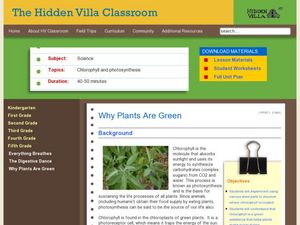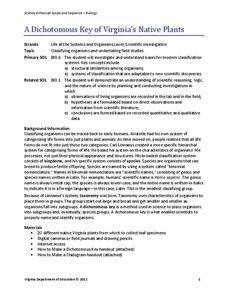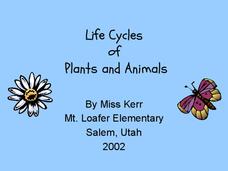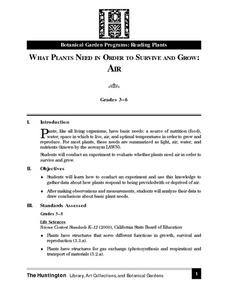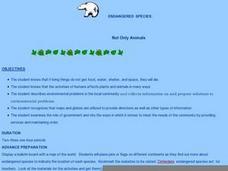Curated OER
The Landscape of France
Students create a nature journal for an imaginary trip around France. They Identify animals and plants that live in France and describe its landscape. In addition they research a period in France's history and prepare a brief summary of...
Curated OER
Why Plants Are Green
Students discover the properties of chlorophyll in plants. In this plant biology lesson, students conduct an experiment to find where the chlorophyll in the plant is located. Students are split into small groups and study plant parts....
Channel Islands Film
Natural Resources, and Human Uses of Plants and Animals
As part of their study of the restoration projects on Santa Cruz Island, class members demonstrate their understanding of the connections among plant life, animals, and the actions of humans by crafting a model that reveals these...
Curated OER
Plant Life Cycles
Follow the life cycle of a dandelion with a lab sheet for kindergartners. They learn about the order of events in a dandelion's life, then put the stages of life in order. Can they describe the life cycle of a pumpkin? For extra...
Curated OER
Temperature
Young biologists discover that plants and animals have protective parts that help them to survive during periods of harsh conditions. After a meaningful class discussion, pupils complete three worksheets by working in pairs to reinforce...
Virginia Department of Education
A Dichotomous Key of Virginia’s Native Plants
Can your class correctly classify plant species? Individuals explore native plants of the local environment and correctly classify them into their respective categories. They investigate differences in the plants and discuss similarities...
Curated OER
Life Cycles of Plants and Animals
What a cute way to introduce life cycles through a PowerPoint! The pictures and basic stages of the lives of butterflies, frogs, and plants are shown with cartoon pictures. there is also a prompt for your pupils to consider other life...
Curated OER
Bee Pollen Popular
The world would be a much different place without the help of pollinators. Read about the important role bats, hummingbirds, and various insects play in plant reproduction, exploring the interdependence of living things in an ecosystem....
Curated OER
Plants, Animals and Our Environment
Students draw and label the basic needs of animals. They draw and label the basic needs of plants. Students understand the basic needs of plants and animals are not only the same, but are interrelated. They know that the environment...
Curated OER
I See a Coyote
Students role-play coyotes looking for natural resources. In this natural resources lesson, students examine the relationship between animal life and the environment. Students play a game that demonstrates how natural resources affect...
Curated OER
What Plants Need in Order to Survive and Grow: Air
Students conduct an experiment to determine whether plants need air in order to survive and grow. They discuss natural resources, analyze slides, and observe and record data from the experiment.
Curated OER
Water Plants
Students examine the plants and animals that make their home in wetlands. While observing, they make sketches of the ones they see with a pencil. To end the lesson, they use watercolors to paint their flowers and animals at the local...
Curated OER
Reading Comprehension Worksheet: Plants
In this reading comprehension about plants worksheet, students study an informative text about the medicinal use of plants. Students answer 4 short answer questions.
Curated OER
Native Plants: An Outdoor Scavenger Hunt
Young scholars recognize various California native species by their physical appearances and characteristics. They recognize the adaptations that plants make to their surroundings and how humans make use of plants.
California Academy of Science
How Big is Big?
In a math or life science class, "mini-me" models are created with cardstock to reflect a 1:10 scale of students' bodies. Learners measure each others' heights with meter sticks, and then reduce the size by 10. After this exercise, they...
Captain Planet Foundation
Energy Flow in the Garden
How can you tell what an owl has eaten? Study the food chain and flow of energy in an ecosystem by dissecting an owl pellet and noting the bones found inside. Additionally, the lesson includes a game about consumers and producers with a...
Curated OER
Seed Dispersal By Animals
In this seed dispersal by animals worksheet, students read for information and complete comprehension activities. In this short answer worksheet, students answer nine questions.
Curated OER
Plants and Animals In the Local Environment
In this identifying plants and animals in their environment learning exercise, students draw pictures of plants or animals that are seen in the air, in water, and on land. Students draw 9 pictures.
Curated OER
Pair the Plants: An Introduction to Scientific Names
Students examine why plants have both common and scientific names, then complete the activity by matching each common plant name with its scientific name. They finish by working in cooperative groups to create an ABC of Plants class book.
Curated OER
Plants and Animals, Partners in Pollination
Students participate in multiple hands-on activities to explore reproduction and pollination. In groups, using a cotton swab and powder, students simulate being pollinators and plants. They name the parts of the flowers and the function...
Curated OER
Endangered Species: Not Only Animals
Students research endangered animals and plants. In this biology activity, students are read Will We Miss Them? Endangered Species by Alexandra Wright before they begin searching for information to complete an endangered species...
Curated OER
Plants and Animals: Partners in Pollination
Students describe the complementary relationships between pollinators and the plants they pollinate, identify adaptations that flowers have developed to "encourage" pollination, and create and draw their own "designer" flowers.
Curated OER
Meet the Plants
Learners examine the difference between living and non-living things. In this living versus non-living lesson, students complete a KWL worksheet and a Living and Non-Living Chart. They examine a variety of plants and non-plants before...
Curated OER
Dry-Land Kalo-Growing New Plants from Stems
Students explore Hawaiian plants. In this Hawaii culture and botany instructional activity, students plant the haha(stem) of a taro plant. Students listen to Hawaiian myths about the taro plant and chorally speak a Hawaiian chant of...
Other popular searches
- Plants and Animals
- Arctic Plants and Animals
- Aquatic Plants and Animals
- Coastal Plants and Animals
- Artic Plants and Animals
- Plants and Animals Needs
- Plants and Animals Interact
- Desert Plants and Animals
- Plants and Animals Die
- Attic Plants and Animals
- Comparing Plants and Animals
- Animals Plants and Water



